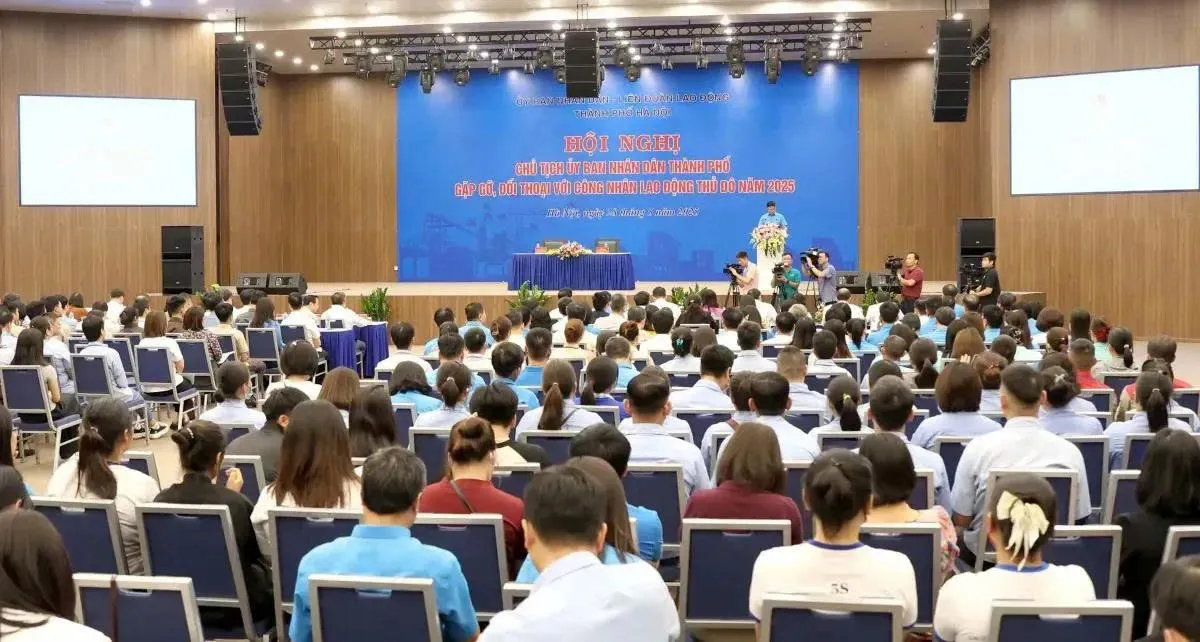Hanoi promises to accelerate affordable housing development
The Hanoi authorities have pledged to address the issues hindering the construction of affordable housing in industrial zones, with the aim of helping workers to settle down.
THE HANOI TIMES — Deputy Director Luyen Van Phuong of the Hanoi Department of Construction on May 28 acknowledged delays in building social housing for workers and low-income earners.

The dialogue between the Hanoi authorities and local workers. Photos: Kinh te & Do thi Newspaper
He said that the growing demand for affordable housing and workers’ aspirations are both urgent and legitimate.
He told a meeting of the Hanoi People’s Committee and local workers at the Hoa Lac Hi-Tech Park in Thach That District that the Hanoi authorities see the development of social housing for workers and low-income earners as one of their top priorities. The city has issued a housing development program through 2030 with clear guidelines on expanding access to social housing.
Specifically, the Management Board of Industrial and Hi-Tech Zones and the city’s Labor Federation are tasked with developing worker housing plans that take into account the role of trade unions. The prime minister has approved a proposal for such a development.
At the conference, Nguyen Thi Huyen Trang, an employee of Star Fashion Co., said Hanoi would be difficult to attract workers from other provinces due to the severe shortage of affordable housing near industrial zones.
"This shortage troubles workers' settlement plans and therefore affects the sustainability of the industrial zones," she said.
Trang called on the city to build low-cost housing and childcare centers near industrial parks to help workers settle down and achieve work-life balance. "Childcare facilities would reduce the burden on working parents and improve productivity," she said.
"Improving workers' living conditions allows for attracting high-quality laborers from other provinces to Hanoi, enhancing its competitiveness and supporting the long-term growth of its industrial zones."
Chu Thi Bau, an employee at Kane Package Co., expressed concern that the current income levels required to purchase social housing make it out of reach in major cities like Hanoi and Ho Chi Minh City.
Accordingly, buyers who are eligible to purchase an affordable home in these cities must have a monthly income of less than VND15 million (US$570). This leaves out those who earn slightly more.
According to Bau, a worker in Hanoi may earn a total of more than $570 per month, including salary, allowances, holiday bonuses, and monthly bonuses.
"Even with that income, we still struggle with living costs in the city. Worse yet, we’re not eligible for social housing,” she said.
She recommended raising the monthly income threshold to between VND20 million ($770) and VND25 million ($960) to ensure more workers can access affordable housing.

A female worker shares her thoughts on the development of social housing.
The prime minister approved several policies to reform the legal framework and streamline procedures for developing social housing. Phuong, Deputy Director of the Hanoi Construction Department, requested that the city’s Labor Federation and other relevant agencies fulfill the minimum conditions necessary to help workers and low-income groups purchase housing.
He promised to work on raising the income thresholds for purchasing social housing, bringing them in line with current living conditions.
Tran Sy Thanh, Chairman of the Hanoi People’s Committee, said that the maximum wage thresholds for social housing buyers are legally defined.
He urged city departments and the Labor Federation to study the 2024 Capital Law and develop solutions that address the specific needs of Hanoi workers.
"One feasible solution is to study a local income coefficient to make more workers eligible to purchase social housing," said Thanh.
He added that Hanoi aims to exceed the social housing targets set by the prime minister this year.
"We will take a more flexible approach to planning and developing rental and social housing around industrial zones," the chairman stated.












